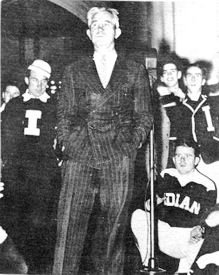Bo McMillin
Alvin Nugent "Bo" McMillin (January 12, 1895 – March 31, 1952) was an American football player and coach at the collegiate and professional level.
After graduating from Centre, McMillin played professionally with the Milwaukee Badgers and Cleveland Indians—two early National Football League (NFL) teams—in 1922 and 1923.
McMillin and Weaver did not have sufficient high-school credits to enter college and enrolled at Somerset High School for the 1916-17 year, playing with Red Roberts.
[10] He was a Hall-of-Fame, three-time All-American, triple-threat quarterback on the Centre Colonels football team under head coaches Chief Myers and Charley Moran.
[13] He began playing football at Centre in 1917, making an impact as a freshman when his 17-yard drop kick defeated the rival Kentucky Wildcats 3–0 (his only field goal).
[15] In 1919, McMillin was selected to the Walter Camp All-America first-team at quarterback after helping the Praying Colonels to a perfect 9–0 record (including upsets of Indiana and West Virginia).
Tech tackle Bill Fincher reportedly tried to knock McMillin out of the game with brass knuckles or "something equally diabolical.
Before 43,000 fans, McMillin dashed 32 yards for the lone touchdown in a 6–0 Centre victory which ended Harvard's 25-game winning streak.
[28] Harvard coach Bob Fisher said after the game, "In Bo McMillin, Centre has a man who is probably the hardest in the country to stop".
[29] MIT students who attended the game to cheer against Harvard tore down the goalposts and hoisted him on their shoulders and for decades afterward, it was known as "football's upset of the century".
"[34] The week before, Centre had defeated Transylvania 98–0 in a game where Spalding's Football Guide reported that McMillin ran back a kickoff 95 yards for a touchdown.
[43] McMillin's success in Louisiana allowed him to move on to Geneva College in Beaver Falls, Pennsylvania, where he was the school's 13th head football coach for three seasons (1925–1927).
His coaching record at Geneva was 22 wins, 6 losses and 1 tie, and he is a member of the Beaver County Sports Hall of Fame.
Mack Flenniken also followed coach McMillin, as well as Cal Hubbard, the only person inducted into the Pro Football and Baseball Halls of Fame and Centenary's first All-American, at both schools.
"[49] In 1928, McMillin was hired by Kansas State University to replace Hall of Fame coach Charlie Bachman.
[54] McMillin's success at Kansas State propelled him into his most noteworthy achievements, coaching at Indiana University for 14 years, beginning in 1934.
[58] Indiana was reportedly at another Big Ten stadium when McMillin sought entrance several hours before the game, only to find the gates locked and guarded.
Despite becoming the school's athletic director and earning apparent lifetime security, with seven years remaining on his most-recent contract the 53-year-old McMillin sought new challenges after the 1947 season.
[62] The Lions also struggled in 1949, with a 4–8 record, but picked up the rights to future star Doak Walker and brought in quarterback Bobby Layne and Heisman Trophy winner Leon Hart the following year.
[63] Continued conflict with players led to McMillin's departure after the end of the 1950 NFL season,[1] which saw the Lions finish with a 6–6 record.
[64] He then took up the challenge of returning the Philadelphia Eagles to their previous glory when he was hired on February 8, 1951, succeeding Earle (Greasy) Neale.
[59] In November 1951, during the last months of his life, McMillin was inducted into the College Football Hall of Fame for his success as a player.
Two months later, he received the Amos Alonzo Stagg Award from the American Football Coaches Association for his contributions to the sport.







